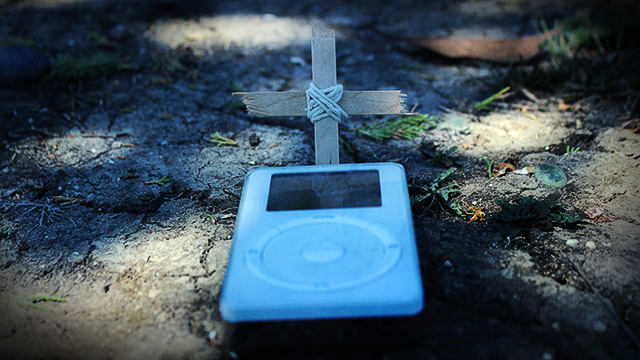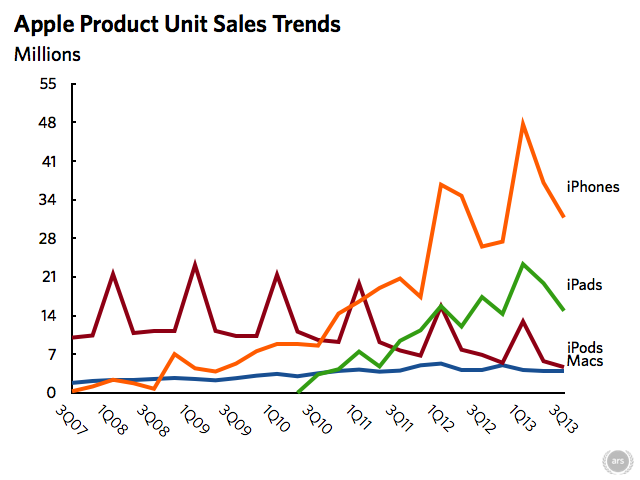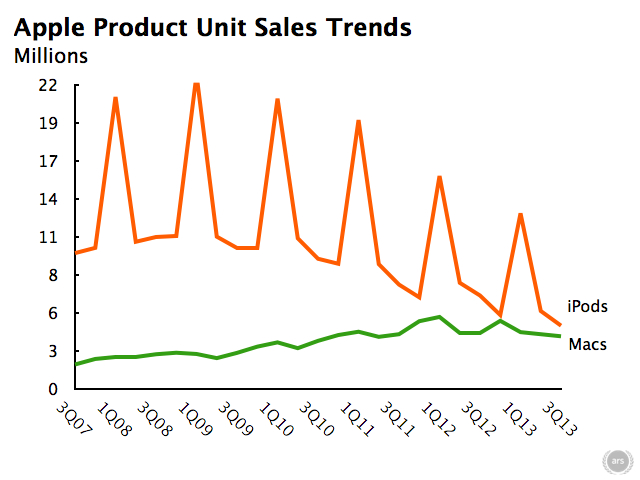
Come this October, the classic iPod as we know it will be 12 years old. And over the last 12 years, the iPod has had a pretty good run. It has arguably been one of a couple of ideas that turned Apple around as the company was teetering on free-fall, and it still remains one of Apple's most iconic products to date.
But that doesn't mean the iPod is selling well—at least not compared to some of Apple's more modern offerings. More than a decade after the introduction of the first iPod, unit sales of the iPod category as a whole (which includes the iPod touch) have been on an overall decline. The decline actually started in mid-2009 and, aside from regular spikes during the holiday season, total unit sales have been going down ever since.

Is now the time for Apple to consider giving the end-of-life designator to some of its older iPod designs that are undoubtedly selling in small numbers? I would argue that it is. (Unless your name is Tim D. Cook, however, there's no way to know the true answer.) As a life-long Apple-watcher, I believe Apple's typical product strategy—coupled with design changes that would need to be made soon—mean some iPod models are more ripe than ever and are ready to be tossed into the compost pile.
Readers will undoubtedly point out a piece I wrote in 2011 wherein I argued that Apple was ready to kill off the iPod classic. That obviously didn't happen then—Apple was clearly not "ready" in 2011—and there's always a possibility that it's not going to happen now, either. That's the thing about speculation: it's not always right. But decades of observing Apple's behaviors, coupled with endless interviews with current and former Apple employees, lead me to believe that we may see the last of certain iPods sooner than later.
The argument for killing (some) iPods now
The numbers from Apple's most recent quarter—the third fiscal quarter of 2013—are what brought this observation back into the foreground. The company sold 4.57 million iPods during Q3—down 2.18 million units from the same quarter last year. This year-over-year drop is fairly precipitous. In Q3 2012, Apple sold 6.75 million iPods, in Q3 2011, Apple sold 7.54 million, and in Q3 2010, Apple sold 9.41 million.
The only fiscal quarter where iPods consistently sell even fewer than the third quarter is the fourth quarter, no doubt because customers are preparing for a possible product refresh as well as the holiday season. I think we can likely expect to see iPod numbers at or below the four million mark when Apple reports its fourth quarter numbers in mid-September. And since Apple repeatedly states that iPod touch sales make up half of all iPod sales numbers, we can assume that the iPod classic, iPod nano, and iPod shuffle combined are going to sell less than 2 million units next quarter. If we tried to look at just the iPod classic—which we can't, because Apple won't break out that number—it would likely be much lower.
No matter what angle we look at, the fourth quarter of 2013 will show the lowest iPod sales numbers we've seen since the days before the iPhone came out. And Apple doesn't typically like holding onto legacies for too long—if a trend is clearly changing, Apple likes to stay ahead of it. (See also: the floppy drive on the Mac, or even optical drives altogether.) And in recent years, both Steve Jobs and Tim Cook have expressed their comfort with newer Apple products cannibalizing older ones—a trend we're clearly seeing with iOS-based devices versus the rest of the iPod line. At what point will the numbers drop so low that it's no longer worth the margins to produce models like the iPod classic?
There's another factor to take into account, too. Apple has been semi-aggressively transitioning its entire mobile product line over to the new Lightning connector from the old 30-pin dock setup that has been used in the iPod since 2003. The company broke its own iPad release pattern in 2012 when it announced a fourth-generation iPad and iPad mini before the holiday season with new Lightning connectors. It certainly looks as if the company is trying to move us all toward the new connector as soon as possible, but if models like the iPod classic are selling at such low rates, it may not be worth the production costs to update those products to Lightning.
The argument against killing any iPods… yet
Of course, this is just a theory—one that I believe in, but a theory nonetheless. The problem with coming up with such theories is that they can end up being wrong at any time based on factors that only Apple knows. As my colleague John Siracusa pointed out as we were discussing this piece, predicting the death of (certain) iPods could end up falling along the lines of predicting the launch of an Apple-branded television set.
One reason why Apple might not kill off the iPod classic this year (or any other "legacy" iPods, like the iPod shuffle or nano) is because, well, it still makes money. It may not make a lot of money, but there are still some die-hards buying legacy iPods like they're going out of style. We are in a post-Jobs world now after all, and Tim Cook hasn't been at the helm for long enough yet to get a clear picture of his product strategy. As such, statements about the company's historical behavior may not apply if the product is still bringing in something.
Another example where the numbers argument fails is in the Mac. Despite the iPod's decline, it still sells more than the Mac every quarter in sheer sales numbers. (Last quarter, Apple sold 3.8 million Macs, and while Apple has stated many times that it still takes the Mac seriously, the growth trajectory isn't exactly generating headlines—in fact, Mac sales numbers for the year so far have been either flat or down slightly.)

Yet Apple is clearly still committed to the Mac for the foreseeable future, despite its relatively "low" sales compared to iOS devices. Various Macs still get updated on some kind of regular basis with new processors, new ports, new displays, new Wi-Fi, and even new physical designs. Yes, Apple likely makes more dollars per Mac sold than dollars per legacy iPod, but the company has shown that it's capable of keeping relatively low-selling products around (hello, Mac Pro) for reasons other than sales numbers. If Apple cares enough about legacy iPods for whatever reason, the company may keep them around, too.
When will it happen?
Whether Apple will retire some of its legacy iPods this year—if not next year, or the year after—is anyone's guess. My prediction for the specific models that might see their EOL days include the iPod classic and possibly the iPod shuffle, the latter because it's so similar to the latest iPod nano design, but with lesser functionality. (One could argue the other way around, too: the iPod nano is just like the iPod shuffle, but three times the cost for slightly more functionality.)
Whatever the case, I still believe the non-touch iPod's days are numbered. It would not come as a surprise to me if Apple began phasing out the lowest-selling ones this fall, but it's possible that the company will continue to milk them for a few more years. Of course, every time I talk about this on Ars or Twitter, I always receive a handful of e-mails from hardcore music listeners who claim to max out their 160GB iPod classics constantly. To those people, my response is "good for you." But maybe it's time to start stocking up on backup iPods for the End Times, because they won't be around forever.
reader comments
157